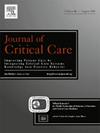Digital health literacy of ICU survivors: A prospective cohort study
IF 2.9
3区 医学
Q2 CRITICAL CARE MEDICINE
引用次数: 0
Abstract
Introduction
Digital recovery programs for Intensive Care Unit (ICU) survivors have demonstrated feasibility, compared to hospital-based face-to-face delivery. However, limited data exist regarding which survivors can participate and if barriers to uptake exist in some survivor groups. This study aimed to evaluate the digital health literacy of ICU survivors, including their access to use digital health technologies.
Methods
A multi-site prospective observational cohort study was conducted. Adult ICU patients admitted for more than 48 h were recruited 4-weeks post-discharge. Participants were consecutively sampled across additional characteristics of interest: older adults (over 65 years of age), rural-residing, and culturally and linguistically diverse (CALD). Eligible patients were contacted via phone, and invited to participate in a single survey, using interpreters as required. The primary outcome measure was the Digital Health Readiness Questionnaire (DHRQ) general score, where greater scores indicate higher literacy. Secondary outcome measures included digital technology access (via the DHRQ digital usage score).
Results
60 participants were enrolled, including 23 characterised as older adults, 21 rural-residing and 13 CALD. The median (Q1-Q3) DHRQ general score for the cohort was 56 (43–63), with highest scores in the rural-residing characteristic survivors (60 (53–65)) compared to the older adult (45 (26–54)) and CALD (41 (25–48)). The median DHRQ digital usage domain score was 15 (12–16), with highest scores for the rural-residing characteristic survivors, compared to the older adult and CALD (12 (9–15)).
Conclusions
Digital health literacy scores were moderate for all ICU survivor participants, with higher scores reported in survivors with the rural-residing characteristic.
ICU幸存者的数字健康素养:一项前瞻性队列研究
与医院面对面分娩相比,重症监护病房(ICU)幸存者的数字化康复方案已被证明是可行的。然而,关于哪些幸存者可以参与以及某些幸存者群体是否存在接受障碍的数据有限。本研究旨在评估ICU幸存者的数字健康素养,包括他们使用数字健康技术的机会。方法:采用多地点前瞻性观察队列研究。在ICU住院超过48小时的成年患者在出院后4周被招募。参与者根据其他感兴趣的特征连续采样:老年人(65岁以上),农村居民,文化和语言多样性(CALD)。通过电话联系符合条件的患者,并邀请他们参加一项调查,根据需要使用口译员。主要结果测量指标是数字健康准备问卷(DHRQ)总分,得分越高表明识字率越高。次要结果测量包括数字技术访问(通过DHRQ数字使用评分)。结果:60名参与者被纳入,包括23名老年人,21名农村居民和13名CALD。该队列的DHRQ总分中位数(Q1-Q3)为56分(43-63分),与老年人(45分(26-54分)和CALD(41分(25-48分)相比,居住在农村的特发性幸存者得分最高(60分(53-65分))。DHRQ数字使用域得分中位数为15(12-16),与老年人和CALD相比,农村居住的特征幸存者得分最高(12(9-15))。结论:所有ICU幸存者的数字健康素养得分均为中等,具有农村居住特征的幸存者得分较高。
本文章由计算机程序翻译,如有差异,请以英文原文为准。
求助全文
约1分钟内获得全文
求助全文
来源期刊

Journal of critical care
医学-危重病医学
CiteScore
8.60
自引率
2.70%
发文量
237
审稿时长
23 days
期刊介绍:
The Journal of Critical Care, the official publication of the World Federation of Societies of Intensive and Critical Care Medicine (WFSICCM), is a leading international, peer-reviewed journal providing original research, review articles, tutorials, and invited articles for physicians and allied health professionals involved in treating the critically ill. The Journal aims to improve patient care by furthering understanding of health systems research and its integration into clinical practice.
The Journal will include articles which discuss:
All aspects of health services research in critical care
System based practice in anesthesiology, perioperative and critical care medicine
The interface between anesthesiology, critical care medicine and pain
Integrating intraoperative management in preparation for postoperative critical care management and recovery
Optimizing patient management, i.e., exploring the interface between evidence-based principles or clinical insight into management and care of complex patients
The team approach in the OR and ICU
System-based research
Medical ethics
Technology in medicine
Seminars discussing current, state of the art, and sometimes controversial topics in anesthesiology, critical care medicine, and professional education
Residency Education.
 求助内容:
求助内容: 应助结果提醒方式:
应助结果提醒方式:


